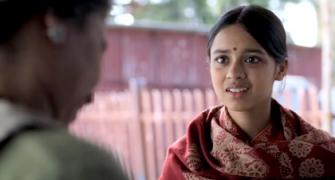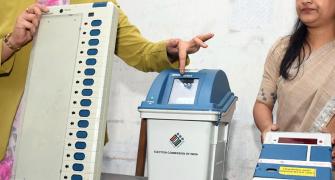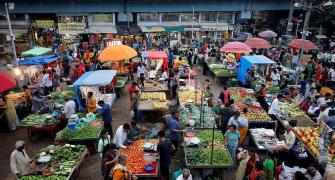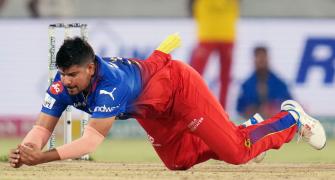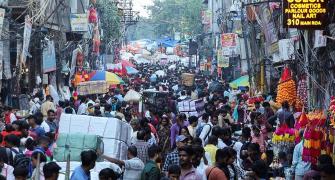Giriraj Rao, the food scientist and chemist whose knowledge of spices led him to play an important role in developing recipes for many Coke products including Fresca and Mellow Yellow, and who made America his home for nearly six decades, was among the first to use the phrase, Indian American.
"He did not like those who had taken American citizenship calling themselves Indian," Subash Razdan, a prominent community leader who knew Rao for more than three decades, recalled.
 |
Rao, 83, a freedom fighter in his college days in Madras, died in Atlanta following a month-long hospitalization for respiratory problems. He had come to America in 1947 with a degree in biochemistry, acquired a master's in food technology from the University of California, and became a naturalised American citizen in 1952.
He loved India as much as he loved America, but at no point was there doubt in his heart that he belonged to the country of his choice. "It is part of my Indian upbringing that I am wedded to my new home," he had told me on several occasions. Rao, one of a handful of people from India to settle down in Atlanta in the early 1970s, used to say, "I cannot be an American citizen, and beat my breast and say 'my country', referring to India".
Rao, one of the top scientists at Coca Cola for more than 25 years, retired as principal investigator, Corporate Research and Development in 1986; he was among 10 Georgia individuals and three state organisations honoured by Governor Sonny Purdue at the 22nd Governor's Awards in the Humanities in 2007. The honours go to the 'humanities heroes' who 'build community, character and citizenship through their efforts in humanities education'.
Rao remained a Hindu, and had asked for a cremation with Hindu rights. But as his older son recalled, Rao would wake his two sons on Sundays, telling them, "Come on boys, it's getting late for Mass".
That stemmed from his first wife, an American of Italian Catholic heritage; after her death, he remarried in 1997, a person from the former Soviet Union who wasn't religious.
"One of the things he was most proud of India was the legacy of Gandhi," said Razdan, who founded the Atlanta chapter of the Gandhi Foundation of India.
Rao, who had gone back to India with his American bride in the early 1950s, took a dislike to the post-Independence political set up and bureaucracy, and returned to America. He was a perennial admirer of Gandhi and was glad to be in Atlanta, which had become home to Martin Luther King Jr, who was inspired by the Indian leader.
The struggle for India's independence was well underway when Rao joined it in the mid 1930s, 'but until Mahatma Gandhi started the non-violent civil disobedience movement, the soul force was missing,' Rao wrote in a 1995 column for The Atlanta Journal-Constitution.
In that column, he called King 'a person with vision and moral courage who could inspire people to have faith in themselves, who could persuade those in power to enact change and to make clear to everyone that to live in harmony is not a dream but an attainable goal'.
As executive director of the Gandhi Foundation, Rao worked to connect the teachings of the two spiritual leaders, and helped erect a statue of Gandhi at the Martin Luther King Jr National Historic Site. 'I think he would rank that as one of his biggest accomplishments,' son Shawn Rao told the media. Rao received a lot of encouragement from King's widow Coretta Scott King. 'She welcomed his Gandhi events,' his son said, 'and gave a home in the King Center to many of them.'
During his student days in America, when the confirmed vegetarian was learning to tolerate egg sandwiches, one of his biggest joys in America was meeting people from different world backgrounds, including those from the Indian subcontinent.
'My first roommate was a Pathan, Farookh Shah Razani, who was a big follower of Khan Abdul Ghafar Khan and was against the division of India,' he recalled in an interview, 'and then the other one was a Muslim from Bengal, but wanted Pakistan to be created. It was quite a sight, two Muslims fighting each other and a Hindu in the middle trying to hold the peace!'
He appreciated the American educational system, where professors and students had a far less formal relationship than in India. "I could not believe that many professors encouraged the students to call them by their first names," he said. And in the Atlanta newspaper, he wrote, 'There was a cordiality I had never experienced in India, where our professors treated us as peons. Here we had professors fixing dinners for their students'.
When he returned to India in the 1950s with the intention of settling down, he admitted he felt like a liberated man, who 'no longer had the peon mentality'. But his family, especially his mother, was not happy he had married an American who remained a Catholic. The mother threatened to go on a hunger strike; Rao called it 'a suicide strike'.
Back in America and working in California, he suffered discrimination. "Many Americans tolerated you as a student," he had said when I interviewed him over two decades ago. "But when they discovered you had married one of their own and was going to make this country your home, they disliked you".
'An Indian was not a known commodity in the late 1940 and '50s,' he wrote in the Atlanta newspaper. 'We had a problem even finding a house. In fact, when we finally did buy one, our neighbour complained, 'Since when have you started allowing these Mexicans in here?'
'My wife did not want to come to Atlanta. In 1973, a white woman married to a non-American, especially a dark one with the only white thing being his teeth, was definitely frowned upon!' he said.
He was reluctant to settle down in Atlanta, but the job at Coca Cola held promise. He said he was the first of two Indians employed by Coke anywhere in the world.
At Coke, senior executives and scientists wondered if he was qualified for the job. It took him a few weeks to establish his credentials and within a few years, he was being sent abroad to launch Coke products.
He brought to the company more knowledge than he had received at the university. 'I am a full-fledged food technologist, chemist and biochemist, and came into Coke with a tremendous experience and knowledge that was not taught in universities,' he said in an interview years ago.
'Today, one of the greatest advantages the industry enjoys is the technological advantages that run parallel, like liquid and solid face chromatography. These analytical tools help synthesise flavours, but in my time you had to have a tremendous first hand knowledge of flavours, including spices, since root beer and many other Coke products have spices in them, and I had that knowledge'.
He had few regrets in life, he had said. Like any American, he too had some reservation about the country but, he hastened to add, returning to America was a decision he rejoiced in, throughout his life.
